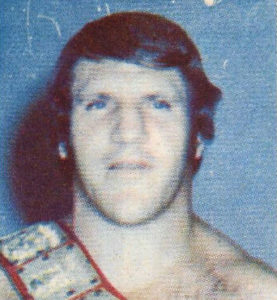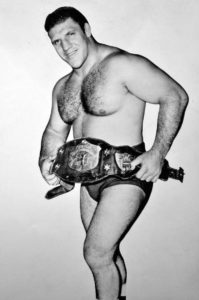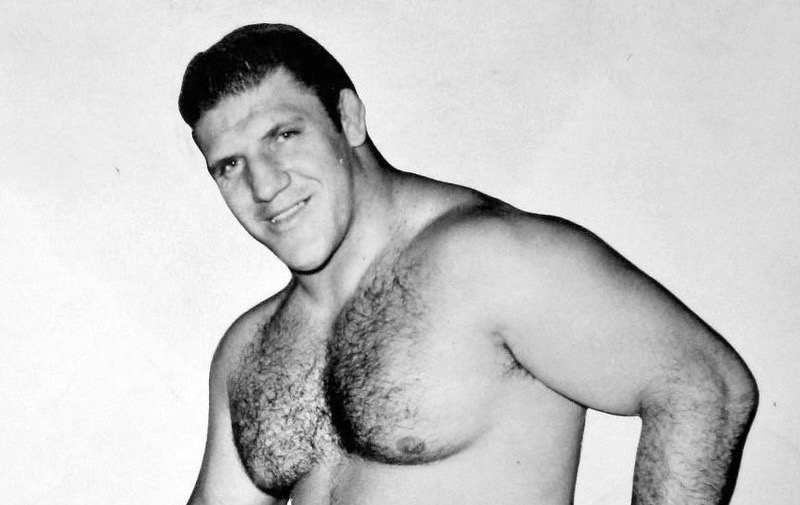As a religion major at Columbia University, I wrote a senior thesis on ritual and religious imagery in professional wrestling during 1990-1991. I subsequently applied for and received Columbia’s Henry Evans Traveling Fellowship, which allowed me to travel around the United States and interview people in the professional wrestling business. I collected eighteen interviews, which will be now be released twice a month in the PWSA Ringside blog series “Before Shoot Interviews.” The interviews, which pre-date the term “shoot interviews”, are presented in the style of an oral history, and offer an interesting look at the professional wrestling industry in the early 1990s. In this interview, the first of three parts, Bruno Sammartino recounts his childhood in Nazi-occupied Italy and the difficult process of immigrating to the United States. I hope you enjoy part one with Sammartino and the “Before Shoot Interviews” series.
Thoughts from 1991: Bruno Sammartino has been regarded by many as the “Living Legend” of professional wrestling, although Sammartino has not been completely comfortable with that moniker. After striking out on multiple interview attempts at John Arezzi’s 1991 “Weekend of Champions” in Queens, NY, I was somewhat dejectedly waiting for the airport shuttle bus when Mr. Sammartino walked up to wait with me. Sammartino was a gracious and generous man who refused to accept money for autographs and allowed a complete stranger (me) to interview him at an airport gate for almost an hour. His descriptions of life and death in Italy during World War II and life as an immigrant in America shed light on how Sammartino found the strength to win so many battles in the ring. Sammartino’s warnings about drug and steroid use in wrestling went unheeded in the 1990s and beyond.

SAMMARTINO: I was born in a little town in a place called Abruzzi, Italy. It’s the central part of Italy. I was born there October 1935. I had a very normal childhood until about the age of nine or so, when World War II affected my particular part of Italy. This was after Italy had fallen, and Germany didn’t take too kindly to the Italians. And we unfortunately were occupied by the worst soldiers we possibly could have been occupied by–the SS troops. So we had to evacuate the town, and that was really something because they were very brutal. A lot of people of this very small village of about a thousand people made it out, and a lot of people did not. But we made it to a town where we hid for the next 14 months. I guess it was really one horrible period of our lives, because this mountain where we had to spend the winter was awesome. The winters were beyond description, they’re so vicious. And besides that, you had to worry about the bombings that came on, and starvation. A lot of the elderly and young died from starvation.
So after 14 months, finally the war ended in my particular area, because the [fighting] moved up north. This was coming toward the end of the war. And we came back in our towns, but the only thing that stopped for us as far as the war goes was the bombings, because starvation continued, the town was devastated, there were bodies literally everywhere, diseases, it was just hell. My father had come to America prior to the war and was stuck here because they closed passages. So he was stuck here and we were stuck there. When we finally connected again, my father asked my mother, through the mail, should he come back to Italy or should he bring us over here. My mother more or less told my dad that everything was destroyed, we had nothing over there, and if we could come to America, then it would be much better for all of us, especially for the kids.
My father took the initiative to bring us over here. In 1947 we were going to come over, and, believe it or not, because of the war I got very, very ill with pneumonia and almost died. I couldn’t pass the physical that you had to take to come here. Everything was in quotas in those days, so we had to wait until the next time, which was 1950. In 1950 we came. When we came over here, to abbreviate the story so that I can get into wrestling, I was a very frail kid. I was not quite 15 years old, because we came in the month of March, and my birthday would have been next October, so I was 14. But I was extremely frail, both me and my brother and my sister. I had lost two brothers and a sister in Italy during that period. We came over here, and the shocker to us was that as a child, I had heard that America has streets paved in gold. And as a little kid I literally took that to mean that America was so filthy rich that I thought, “Wouldn’t it be great to go to America, away from this poverty and this other stuff and be rich all of a sudden?”
But when we finally came over, my poor father had bought a home near the steel mills where he worked, because he didn’t drive. It was an old home. He paid $5,000 for that home. And we came in this house and were shocked, because we come to America, and here the plaster was half-broken. And smoke! We come from these mountains where the air was so fresh, and here we were right up next to the steel mills. In those days, Pittsburgh was known as a smoky city. The smoke was unbelievable, the air was terrible. And then to top it all off, my dad was one of the first Italians to move out of what they called Little Italy, and he moved into this particular area because of the convenience to where he worked.
And as it is often in this country, we were not well-accepted because we were different, you know. So my brother and I were going to this school to learn how to speak English, and every day we were getting the heck beat out of us. My father found it so frustrating because of what we had gone through during the war, and he came to this school and told the teacher, “You know, these kids have gone through hell, they’re very frail as a result of the war, and now they’re getting beat up daily. This is one thing they don’t need. Can something be done?” So it worked out OK, my brother and I could go to school 15 minutes later than everybody else, and get out 15 minutes early. But the frustrations and anger were there.
I met a Jewish kid by the name of Maurice Stein. I’ll never forget him because he was a good, good guy. He felt sorry for us, he really did, and he said, “I belong to the YMHA, that’s the Young Men and Women Hebrew Association. If you could join, if you could scrape up the money, I can show you how to work out. You’ll get healthier, you’ll get stronger.” This sounded good to me. So my brother and I, we went to this well-to-do area called Shenley Farms, and we asked people if they needed their grass cut. They would give us a quarter, or fifty cents. But we did it long enough until we raised $13 for the membership. And we joined the “Y”.
I can tell you that I became addicted almost immediately to physical fitness. They had a wrestling program, amateur wrestling, and they had weight training. By night we were working out, getting healthy, getting to look better, and so forth. I always used to try to get guys on the mat to work out. My gym teacher was friends with a guy named Rex Perry, who was a wrestling coach at the University of Pittsburgh. Perry wanted to know if I’d be interested in going up there and working out with the big wrestlers. I started going on that program six days a week, religiously, no matter what work I did, like summertime when I was working construction. It didn’t matter. At night I’d be at that gym when the gym closed. I did that religiously for years.

I became, I thought, a pretty good wrestler. And I became a pretty strong guy to where I started competing in both Olympic lifting and power lifting. I stated setting some records, first city records, then state records. In 1959 I set some power-lifting records. That’s when I did my 565-pound bench press. I did a 715-pound squat and a 690-pound dead lift. By now I’m a big guy, about 265 pounds, 270. I had just gone to Oklahoma to compete in the North American Weightlifting Championships. I don’t know if you ever heard of Bob Prince. He was the “Voice of the Pittsburgh Pirates,” and he had a TV show. I appeared on his show at different times to give a weightlifting demonstration, or even a wrestling demonstration. Whenever I won a contest, he invited me to come on. One time when I came on, we were talking about this contest that I won, and Prince mentioned on the air, “Bruno, do you still go up to Pitt, the University of Pittsburgh, to work out in wrestling?”
And I said, “Oh yeah, because that’s my first love, wrestling. I want to be a professional wrestler. But for weightlifting, I’ve gotten pretty good at it, and I love to compete, so I do both.”
Well, who was listening to this? A guy by the name of Rudy Miller, who was a representative of Capitol Wrestling, which later became the WWF. He was running the TV wrestling show in Pittsburgh, which was on live. He happened to watch this show, and he immediately started inquiring if anyone knew who I was. People at the station knew, of course, because a couple of those guys there had gone to high school with me. They said, “Yeah, that’s Bruno, he’s a friend of ours.”
Miller said, “Jeez, I’d sure like to meet him.”
Anyway, to make a long story short, they contacted me. The following week, they asked me if I would come down for studio wrestling, because this promoter wanted me. And of course this is what I wanted anyway. So when he saw me, he was very impressed. I weighed 270 pounds. He said, “You really can lift what they said on that TV show?”
I said, “Yeah.”
He said, “Jeez, you gotta come to Washington. I have two promoters, Vince McMahon [senior, not junior, who currently is owner of the WWF] and Toots Mondt. I would like them to look at you, because you have a wrestling background.”
I said, “Yeah, that’s my ambition, to become a professional wrestler.”

He gave me some money that bulged my eyes–$300. I’d never seen $300 in my life. He told me to catch this plane and go to Washington at such and such a date. I went to Washington, I met Vince McMahon, I met Toots Mondt, and they’d arranged for me to go to the old Capitol Arena in Washington. It was an old arena but a popular one there. They sent a couple of professional wrestlers that up there for me to work out with. They wanted to see what I had. I impressed them pretty well because I was strong and I could wrestle. So from that, they said, “You know, kid, you’ve got a lot going for you. We’d like to train you for a couple of months and then turn pro.”
And I said, “Wow! I didn’t realize it was that easy.”
I had just gotten married. I went home, and I told my wife. My wife was very much against it. She said, “Well, my God. You had thought you were going to be a carpenter. Why do you want to wrestle?”
I said, “It’s always been a dream of mine, you know that. I have to give it a shot.” Anyway, to make a long story short, I told my people at work that I appreciated them giving me work for the last two years, but I had to pursue this, and they wished me luck. Then I went to Washington, and for the next two months I was there and trained. I trained, and then–boom–I went back to Pittsburgh to my first professional match, and that was October 1959. That’s how I got into it.
Thoughts from 2022: I would like to think humanity is moving forward over time, but many people in Ukraine now are experiencing the same horrors that Bruno Sammartino experienced as a child in Italy. I am also struck by the consistency in how the WWE has looked to amateur sports stars for recruits into their ranks in the late 1950s, as well as today.


Lee,
I throughly enjoyed your written article about Brunno Sammartino! Wrestling was never my forte as you know, but I learned a lot reading about your adventure with Brunno, and his interesting life experiences. You are a wonderful writer, like your Grandma Greer.
Proud of you, Mom